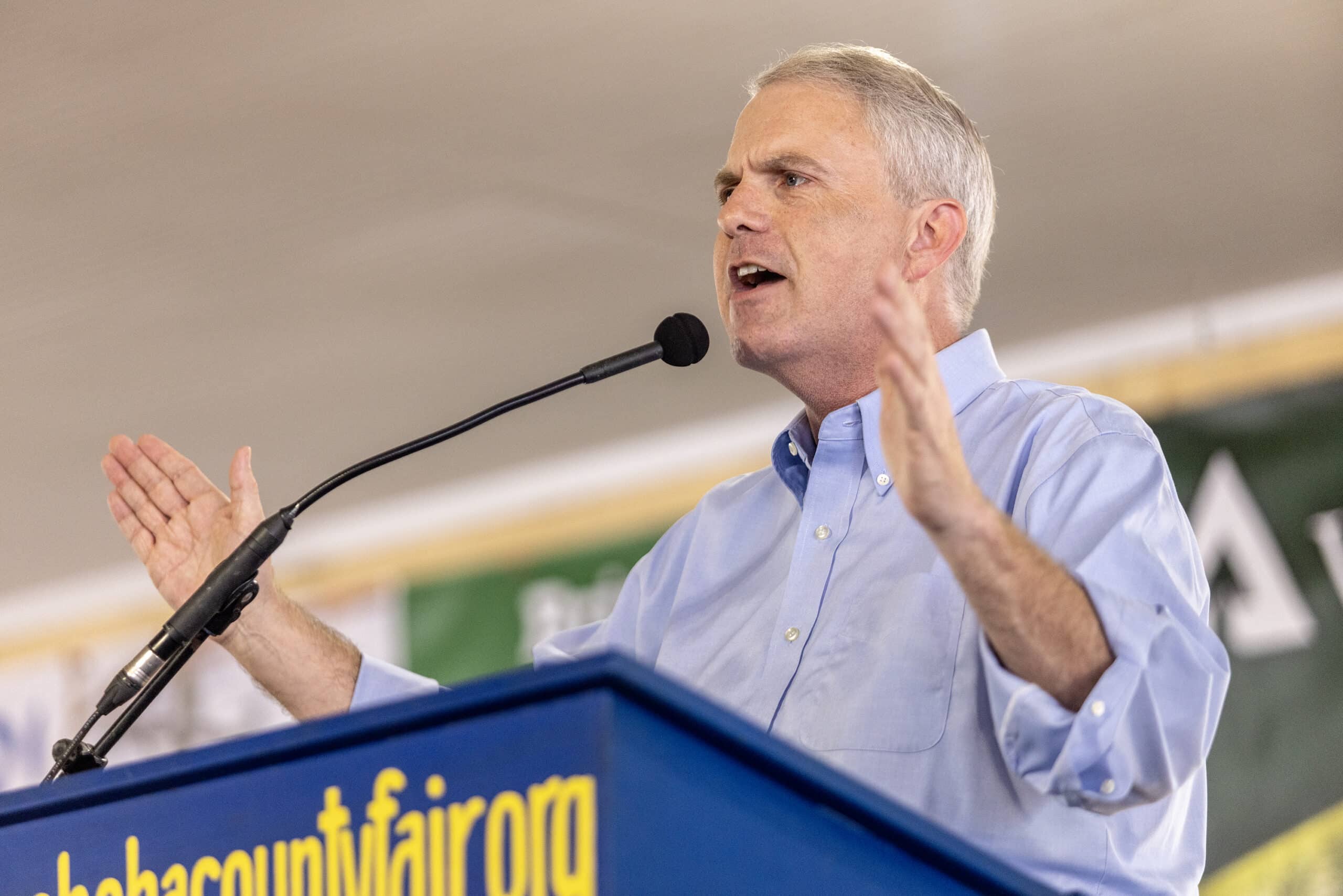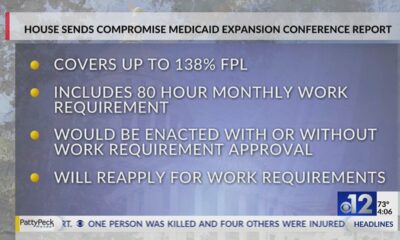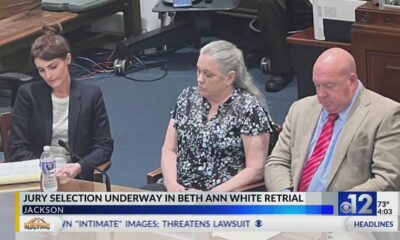Mississippi Today
Rowdy Neshoba County Fair attendees show that bitter race for governor is officially in full swing

NESHOBA COUNTY FAIR — The sheer intensity of crowd interaction at the Neshoba County Fair on Thursday largely overshadowed the traditional stump speeches from the two leading candidates for governor, signaling the arrival of an intense election cycle that will grip the state for the next four months.
Hundreds of supporters of incumbent Republican Gov. Tate Reeves and Democratic candidate Brandon Presley filled the Founder's Square benches and fiercely interacted with the two candidates in a way that hasn't been seen at the event in recent years.
Reeves' supporters repeated loud “Tate!” chants during the governor's speech, while Presley's supporters shouted “Let's go, Brandon!” when the Democrat delivered his 10-minute stump. And, at certain points, the two factions engaged in chant battles.
When Presley asked the crowd who they trusted to stand up for working Mississippians, Reeves' faction shouted “Tate” to dump cold water on the Democrat's speech.
And when Reeves concluded his speech, Presley supporters shouted, “Lock him up,” an apparent extension of their attempt to tie the governor to the welfare scandal, though prosecutors have not charged the governor with any crime connected to the issue.
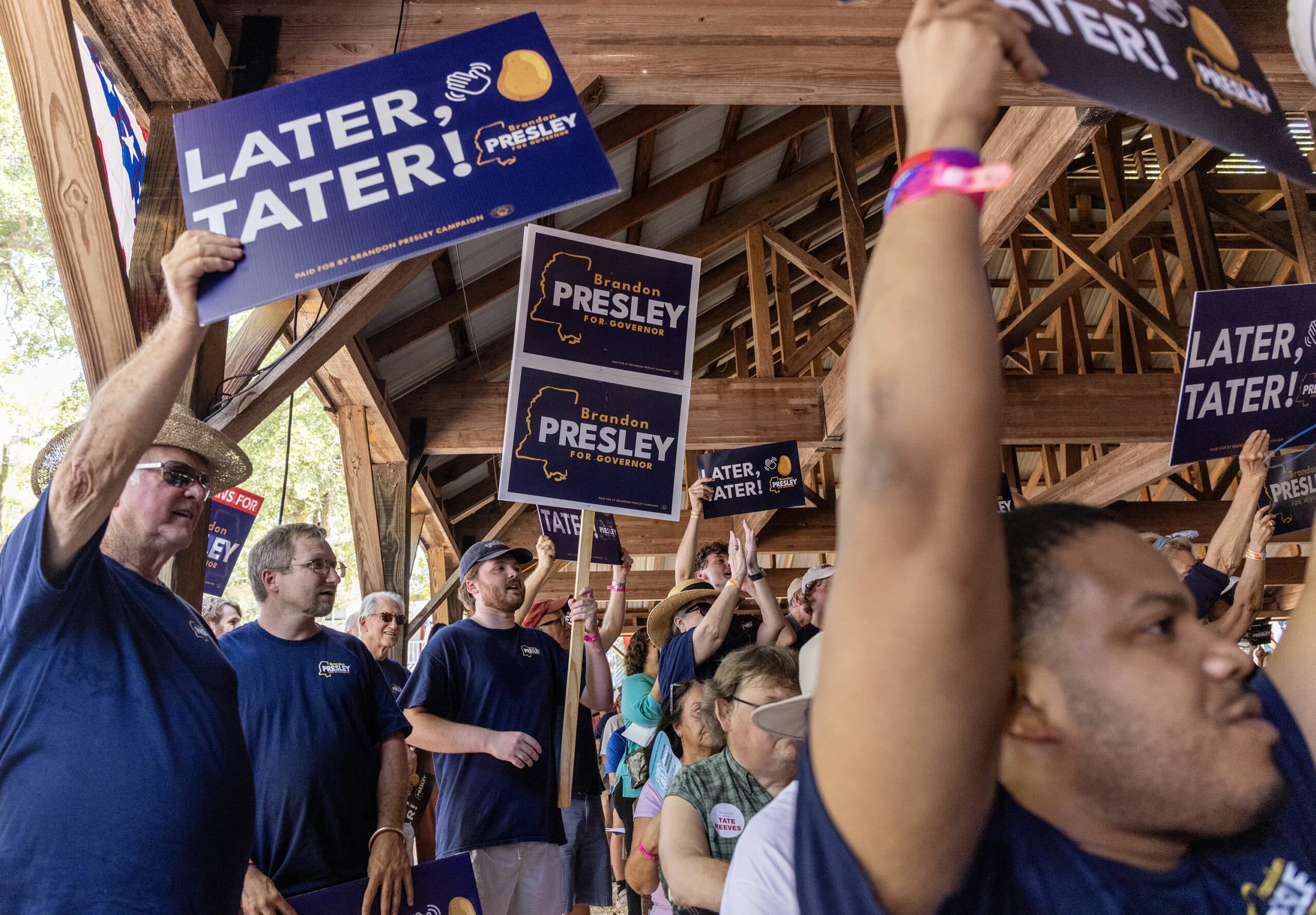
The first-term governor, at one point during his speech, even used his allotted time to engage in a back-and-forth with a Presley supporter who was standing near the stage.
“To support him, you've got to believe we are on the wrong track,” Reeves said to the supporter. “You've got to believe that our culture is wrong and that our values are bad. You want to say yes to that, sir, because you believe it? You believe it, don't you?”
While neither candidate delivered any new policy pitches, their messaging and starkly differing views of Mississippi's present and future became crystal clear under the blistering July heat at one of the state's longest-running political traditions.
Reeves staunchly defended his record as a conservative leader and attacked Democratic Party values while Presley attempted to cast the governor as a derelict politician who is numb to the difficulties average Mississippians deal with.
Reeves, running for a second term, rattled off accomplishments over the last four years, including recruiting new jobs to the state and improving education test scores.
“To hear Brandon's fiction, Mississippi is just not doing well,” Reeves said. “It's all my fault. … He said, and I quote, ‘Under Tate Reeves' leadership, we are moving in the wrong direction.' That's what Brandon Presley says. The math says that's pure fiction.”
Presley, the current utility regulator for north Mississippi, panned the governor for not doing enough to keep health care infrastructure in the state from deteriorating and again reiterated to reporters his support for expanding Medicaid coverage to the working poor.
“Much like Nero of old, he's fiddling while our hospitals are burning to the ground, and he doesn't care,” Presley said of Reeves.
Reeves called Presley's Medicaid expansion push a “welfare check” to poor Mississippians and later told reporters he believed the better approach was for more Mississippians to obtain private insurance coverage that tied to their careers.
The governor also tied Presley, a moderate Democrat, with other liberal candidates across the nation, such as California Gov. Gavin Newsom and former Georgia gubernatorial candidate Stacey Abrams, common rhetoric Reeves has used during the campaign.
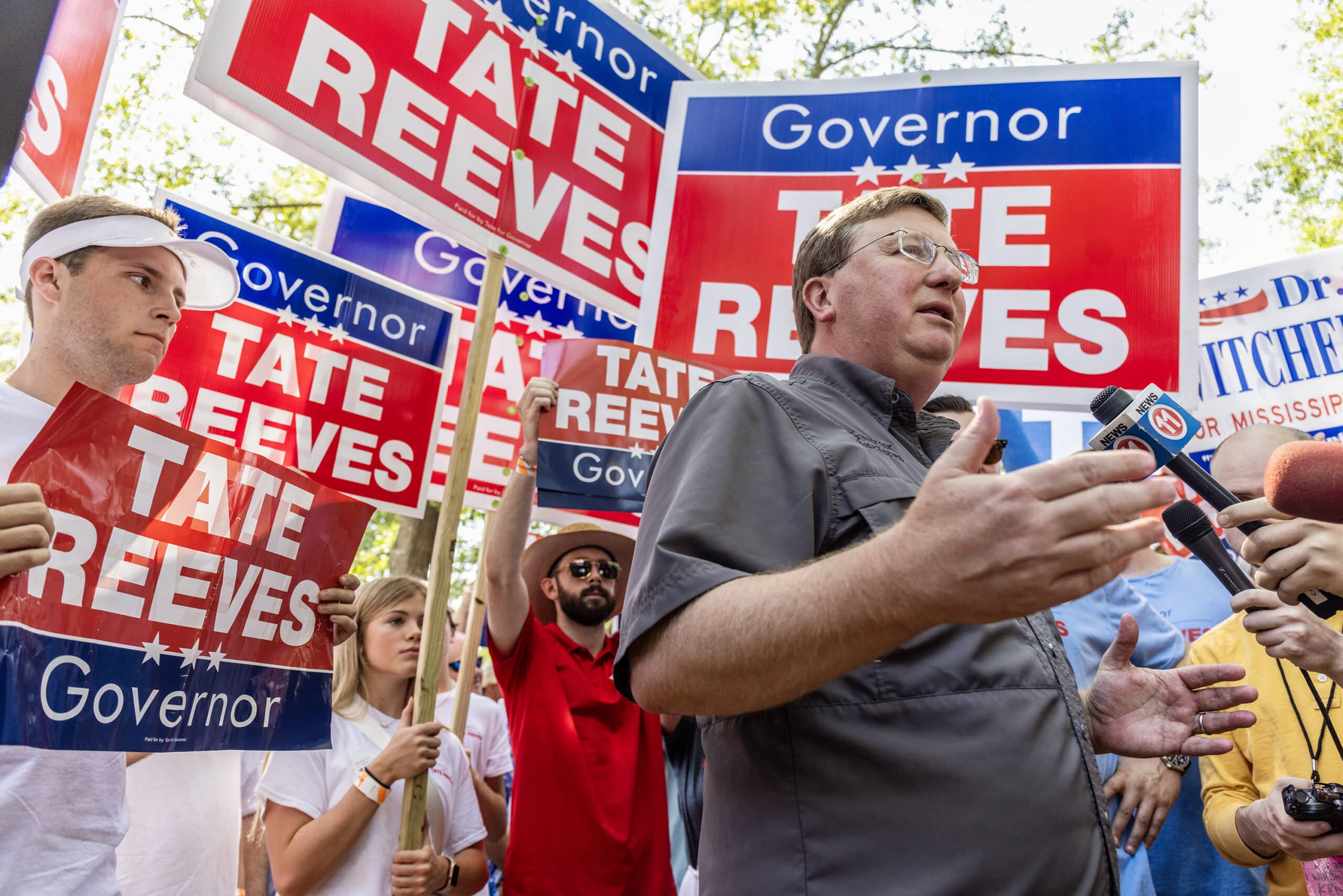
Presley rejected that notion and said the governor was using that tactic as a smokescreen to keep from discussing real campaign issues.
Typical publicity stunts also made their way to the fairgrounds, with two Presley supporters donning orange jumpsuit costumes mimicking prison inmates to symbolize two of the governor's donors who have pleaded guilty to crimes connected to the state's welfare scandal.
The Wednesday speeches marked a rare instance in which all three GOP candidates for governor appeared in the same location.
Reeves is expected to capture the Republican nomination in the Aug. 8 primary election, though his two GOP opponents, David Hardigree and John Witcher, also delivered stump speeches on Wednesday.
Hardigree, a retired military member, advocated for new efforts to crack down on crime throughout the state, and Witcher, a doctor, said he would work to enact conservative social policies such as putting Bibles in public school classrooms.
The winner of the primary will compete against Presley, the only Democratic candidate, in the general election on Nov. 6.
This article first appeared on Mississippi Today and is republished here under a Creative Commons license.
Mississippi Today
Lawsuit in death of man following Jackson police encounter may be headed to trial
The family of George Robinson plans to move forward with a wrongful death lawsuit against the city of Jackson and three former police officers after rejecting a nearly $18,000 settlement offer.
Attorney Dennis Sweet III made the intentions of Bettersten Wade, Robinson's sister, and Vernice Robinson, Robinson's mother, clear in a Thursday letter sent the day after the City Council approved a $17,786 payment to settle the family's 2019 lawsuit.
“This is more than anyone should have to endure. Much less have the City of Jackson tout the purported term of settlement as some sort of victory,” Sweet wrote in the letter. “Needless to say, no individual or party obtained a victory in this matter.”
The financial terms of the settlement and plaintiffs' identities were not supposed to be disclosed publicly and the council did not approve the settlement in executive session, Sweet said. According to Mississippi's open meeting law, any public body can enter executive session for a number of reasons, including for negotiations relating to litigation.
Sweet was not immediately available to comment Monday. Last week, he told WLBT he would take it to trial.
Council President Aaron Banks, who was also not immediately available for comment, said the settlement was freely negotiated among the parties and signed by Wade and Vernice Robinson, who had their attorneys with them, according to a Friday statement to the Clarion Ledger.
Banks disputed Sweet's claims that the city violated any terms of the settlement, such as a confidentiality agreement, saying the city didn't agree to one and that settlements are public records, according to the statement.
“The City intends to honor the agreement it reached and expects the Wade family to do so, also,” Banks said in the statement.
However, some city council members said after the meeting that they were not aware of a confidentiality agreement.
City Attorney Drew Martin declined to comment Monday.
All the parties met for mediation April 12. Sweet said that during the session, a representative from the city said it is in “financial straits and did not possess substantial funds in which to resolve Ms. Wade's claims against it.” The lawsuit complaint asked for a jury trial and damages to be determined by a jury.
Banks's statement did not address the attorney's claim about the city's finances.
Wade agreed during mediation to settle with ambulance provider American Medical Response and to allow the city to join that settlement and end litigation, according to Sweet's letter.
“Had AMR not agreed to a substantial settlement amount, Ms. Wade would not have settled with the City of Jackson,” he wrote in the letter.
The company settled for a different amount that was not disclosed, according to Sweet's letter.
As of Monday, electronic court filings for the lawsuit do not show that the judge has signed off on a settlement.
In January 2019, 62-year-old Robinson was pulled from a car and beaten by officers, leaving him with severe injuries. At the time, he was recovering from a stroke. Robinson died days later.
In 2022, former detective Anthony Fox was convicted culpable-negligence manslaughter for Robinson's death, while charges against officers Desmond Barney and Lincoln Lampley were dismissed a year earlier.
Fox was incarcerated until January when the Mississippi Supreme Court overturned his conviction and issued an acquittal, freeing him. Fox has returned to work for the Canton Police Department.
This isn't Wade's only loss and fraught experience with the city, Sweet said.
Last year, her son Dexter died after being hit by a car driven by an off-duty Jackson police officer. He was buried unidentified in the Hinds County pauper's field, despite having identification on him. His family did not know he was there until months later.
This article first appeared on Mississippi Today and is republished here under a Creative Commons license.
Mississippi Today
Back-and-forth: House, Senate swap Medicaid expansion proposals, counter offers
After lawmakers in the House and Senate compromised on several points of the Medicaid expansion bill, there remains one major hurdle to be cleared: the necessity of a work requirement.
Any bill that makes expansion contingent on the approval of a work requirement will likely be null and void, due to federal regulations that have banned work requirements.
The House and Senate last week compromised on one major point of contention between the two chambers, income eligibility: the Senate conceded to cover people making up to 138% of the federal poverty level, about $20,000 for an individual, and the House agreed to having those who make more than 99% of the federal poverty level enrolled in subsidized private insurance – rather than straight Medicaid – which would be made affordable by state-federal Medicaid funds.
They are still far apart on the details of a work requirement. Monday afternoon, the House proposed a counter offer to the Senate's stringent work requirement, one in which Medicaid would be expanded either way, but Mississippi would be mandated to reapply for the work requirement every year, and would be required to immediately adopt a work requirement if the federal government ever changed its policy.
READ MORE: House, Senate leaders swap Medicaid expansion proposals as Monday night deadline nears
Here's a breakdown of the various expansion plans proposed this session to provide health insurance for low-income, mostly working, people in the poorest and unhealthiest state in the country.
Original House bill, Feb. 28
House Bill 1725, authored by Speaker Jason White and Medicaid Chairwoman Missy McGee, R-Hattiesburg, was originally written as a mostly-traditional expansion bill, similar to programs most other states have adopted. It would:
- cover income-eligible adults making up to 138% of the federal poverty level, about $20,000 for an individual.
- include a work requirement that would be removed if the federal government did not approve it.
- draw down $1 billion federal dollars by increasing the federal match rate.
- qualify Mississippi for a two-year bonus of $650 million offered to newly-expanded states – which would make the program free to the state for a total of four years.
It overwhelmingly passed the House 98-20 at the end of February.
Original Senate proposal, March 28
In late March, the Senate Medicaid committee passed House Bill 1725 with a strike-all, and replaced the original bill's language with its own language, which Medicaid Chairman Kevin Blackwell, R-Southaven, referred to as “expansion lite.”
The plan proposed:
- covering working Mississippians making up to 99% of the federal poverty level, about $15,060 annually for an individual.
- leaving out those making between 100% and 138% of the federal poverty, and as a result, would turn down the $1 billion in federal dollars
- calling for quarterly proof of employment, leaving experts worried that the plan would be administratively burdensome and costly – as well as confusing for enrollees. That's if the federal government approved the waiver necessary for the work requirement – an unlikely scenario under the Biden administration, which has rescinded such waivers previously granted under the Trump administration and has not approved new ones.
This austere version of expansion passed the full Senate at the end of March with a veto-proof majority – an important detail since Gov. Tate Reeves has indicated he will veto any expansion bill that comes to his door.
House's response to the Senate's strike-all, April 3
The House invited the Senate to conference in early April to hash out the details of House Bill 1725.
House leadership countered the Senate's austere version of expansion with a compromise: a “hybrid model” which would cover those making up to 138% of the federal poverty level, but would put those making between 100% and 138% on private health insurance policies through the federal exchange.
The cost of these policies would be subsidized through federal-state Medicaid funds.
Senate's response to the House's compromise, April 26
Senate conferees sent the House a plan with a “hybrid model,” similar to what the House pitched, but maintained a firm stance on a work requirement — although they dropped the quarterly employment verification to annually.
The following Sunday, Senate conferees retracted the requirement in their initial proposal that Mississippi sue the federal government if the Centers for Medicaid and Medicare Services doesn't approve the work requirement waiver.
Democrats in the House reportedly said they would not vote for any measure with the latter provision.
If initially turned down on the work waiver by the federal government, the new Senate proposal would require the state to appeal again to the agency if any other state gets a similar program approved later.
The latest offer from the House, April 29
House conferees countered the Senate's strict work requirement plan on Monday with a plan that would expand Medicaid with or without the work requirement, but would require the state to apply for the waiver initially and continue to do so once a year. It would also include a “trigger law,” similar to North Carolina's, mandating that if the federal government ever changed its policy on allowing states to implement a work requirement, Mississippi would move to implement one immediately.
This article first appeared on Mississippi Today and is republished here under a Creative Commons license.
Mississippi Today
House, Senate leaders swap Medicaid expansion proposals as Monday night deadline nears
House and Senate leaders ahead of a major Monday night deadline continued to trade proposals back and forth on Monday attempting to find a compromise plan to expand Medicaid coverage to poor Mississippians.
House Medicaid Chair Missy McGee, a Republican from Hattiesburg, told Mississippi Today that she delivered another compromise proposal to Senate leaders Monday afternoon that would direct the Division of Medicaid to apply for a federal waiver to allow Mississippi to implement a work requirement for Medicaid recipients.
However, if the Centers for Medicare and Medicaid Services denies the state's waiver for work requirements, the proposal would still expand either traditional Medicaid coverage or government-subsidized private insurance policies to people who make up to 138% of the federal poverty level, or about $20,000 for an individual.
The House's latest measure also contains “trigger language,” similar to North Carolina's, which requires the division to reapply for a work requirement waiver as soon as the CMS approves work requirements in other states.
The House's Monday offer follows a plan Senate leaders sent to the House on Sunday evening that also would expand eligibility to 138% of the federal poverty level still but contains an ironclad work requirement for expansion to take effect.
READ MORE: Lawmakers negotiate Medicaid expansion behind closed doors, hit impasse on state budget
The reason the two chambers are haggling over work requirements in the bill is because the Affordable Care Act, the federal legislation that allows states to expand Medicaid coverage, does not authorize work requirements. However, states can seek a federal waiver to implement them.
CMS under the Trump administration did sign off on some states using work requirements, but under the Biden administration, the federal agency has not approved requests and rescinded the ones that had been approved.
The House is willing to establish an expansion plan without a work requirement, but Senate leaders have maintained they will only support an expansion program that mandates work requirements — a stance that would at the least delay expanded coverage — perhaps for years, or prevent it from ever happening.
House leaders have pointed out that people with income above the federal poverty level are likely working.
Lawmakers have for the past couple of months been debating on how to expand Medicaid coverage for poor working Mississippians and help the state's struggling hospitals.
The House initially voted to expand coverage to an estimated 200,000 people, and accept more than $1 billion a year in federal dollars to cover the cost, as most other states have done. The Senate initially passed a far more austere plan, that would cover about 40,000 people, and would decline the extra federal money to cover costs.
Since those plans passed, each has offered counter proposals, but no deal has been reached.
Senate leaders have indicated they might not be able to secure enough votes for the House's proposals. Facing a threat of a veto from Gov. Tate Reeves, lawmakers would have to have a two-thirds vote in each chamber to override him.
The three senators and three House members tasked with reaching a compromise face an 8 p.m. deadline to agree on an initial Medicaid expansion plan, but that deadline could be suspended if two-thirds of the lawmakers in both chambers agree to the suspension.
The six negotiators could also agree to file a “dummy” bill, or a bill with no substantive plan, to meet the 8 p.m. deadline and continue to negotiate on a final plan.
This article first appeared on Mississippi Today and is republished here under a Creative Commons license.
-
Local News4 days ago
Sister of Mississippi man who died after police pulled him from car rejects lawsuit settlement
-
Mississippi Today4 days ago
At Lake High School in Scott County, the Un-Team will never be forgotten
-
Mississippi Today1 day ago
On this day in 1951
-
Mississippi News2 days ago
One injured in Mississippi officer-involved shooting after chase
-
Mississippi News7 days ago
Cicadas expected to takeover north Mississippi counties soon
-
Mississippi News6 days ago
Viewers make allegations against Hatley teacher, school district releases statement – Home – WCBI TV
-
Mississippi News Video5 days ago
Vehicle struck and killed man lying in the road, Alcorn County sheriff says
-
Mississippi News4 days ago
Ridgeland man sentenced for molesting girl
